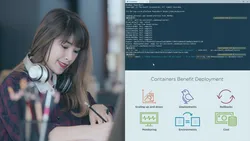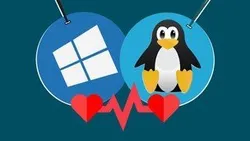![Docker Tutorial for Beginners Docker Full Course Access to FREE LABS [No Ads]](/ccsimg/td_book/check/4d03869ea4e0c4de1e3cf8e9beaf8d6e.webp)
Docker Tutorial for Beginners Docker Full Course Access to FREE LABS [No Ads] 
This course provides a comprehensive introduction to Docker, a popular containerization platform. It covers topics such as installation, commands, environment variables, images, networking, storage, compose, and registry. Learners will gain the skills to create and manage Docker containers, as well as access to free labs. ▼
ADVERTISEMENT
Course Feature
![]() Cost:
Cost:
Free
![]() Provider:
Provider:
Youtube
![]() Certificate:
Certificate:
Paid Certification
![]() Language:
Language:
English
![]() Start Date:
Start Date:
On-Demand
Course Overview
❗The content presented here is sourced directly from Youtube platform. For comprehensive course details, including enrollment information, simply click on the 'Go to class' link on our website.
Updated in [February 21st, 2023]
This course provides an overview of Docker, a containerization platform. It covers topics such as Docker installation, commands, environment variables, images, CMD vs Entrypoint, networking, storage, compose, registry, engine, Windows, Mac, container orchestration, Swarm, Kubernetes, and conclusion. It also provides access to free labs and no ads. This course is ideal for beginners who want to learn more about Docker.
[Applications]
After completing this course, learners can apply their knowledge of Docker to create and manage containers, images, networks, and storage. They can also use Docker Compose to deploy applications and Docker Swarm to orchestrate containerized applications. Learners can also use Kubernetes to manage containerized applications in production. Additionally, learners can use Docker on Windows and Mac to create and manage containers.
[Career Paths]
1. DevOps Engineer: DevOps Engineers are responsible for managing the development, testing, and deployment of applications and services. They are also responsible for automating processes and ensuring that systems are secure and reliable. As the demand for DevOps Engineers continues to grow, the need for professionals with experience in Docker and other container technologies is increasing.
2. Cloud Engineer: Cloud Engineers are responsible for managing cloud-based applications and services. They are also responsible for ensuring that applications are secure and reliable. As the demand for cloud-based services continues to grow, the need for professionals with experience in Docker and other container technologies is increasing.
3. System Administrator: System Administrators are responsible for managing and maintaining computer systems. They are also responsible for ensuring that systems are secure and reliable. As the demand for system administrators continues to grow, the need for professionals with experience in Docker and other container technologies is increasing.
4. Software Developer: Software Developers are responsible for designing, developing, and testing software applications. They are also responsible for ensuring that applications are secure and reliable. As the demand for software developers continues to grow, the need for professionals with experience in Docker and other container technologies is increasing.
[Education Paths]
1. Bachelor's Degree in Computer Science: A Bachelor's Degree in Computer Science is a great way to gain a comprehensive understanding of the fundamentals of computer science, including programming, software engineering, and computer systems. This degree will also provide students with the skills needed to develop and maintain software applications, as well as the ability to design and implement computer networks. Additionally, this degree will provide students with the knowledge and skills needed to work with Docker and other container technologies.
2. Master's Degree in Cloud Computing: A Master's Degree in Cloud Computing is a great way to gain an in-depth understanding of cloud computing technologies, including Docker and other container technologies. This degree will provide students with the skills needed to design, develop, and maintain cloud-based applications and services. Additionally, this degree will provide students with the knowledge and skills needed to work with cloud-based infrastructure and services, as well as the ability to design and implement cloud-based networks.
3. Master's Degree in Data Science: A Master's Degree in Data Science is a great way to gain an in-depth understanding of data science, including data analysis, machine learning, and artificial intelligence. This degree will provide students with the skills needed to analyze and interpret data, as well as the ability to develop and maintain data-driven applications. Additionally, this degree will provide students with the knowledge and skills needed to work with Docker and other container technologies, as well as the ability to design and implement data-driven networks.
4. Master's Degree in Cybersecurity: A Master's Degree in Cybersecurity is a great way to gain an in-depth understanding of cybersecurity, including network security, application security, and data security. This degree will provide students with the skills needed to design, develop, and maintain secure applications and networks. Additionally, this degree will provide students with the knowledge and skills needed to work with Docker and other container technologies, as well as the ability to design and implement secure networks.
Course Provider

Provider Youtube's Stats at AZClass
Discussion and Reviews
0.0 (Based on 0 reviews)
Explore Similar Online Courses

Grammar for IELTS

Drugs for Epilepsy

Python for Informatics: Exploring Information

Social Network Analysis

Introduction to Systematic Review and Meta-Analysis

The Analytics Edge

DCO042 - Python For Informatics

Causal Diagrams: Draw Your Assumptions Before Your Conclusions

Whole genome sequencing of bacterial genomes - tools and applications

Managing Docker on Linux Servers

Fundamentals of Docker and Kubernetes for NET Developers


Start your review of Docker Tutorial for Beginners Docker Full Course Access to FREE LABS [No Ads]